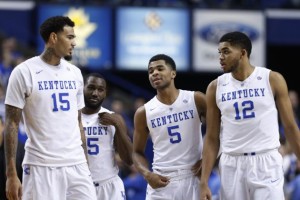Never Mind RPI: Behind The Logic of The Bracket

There is no doubt that Kentucky will be at the top of the bracket when the NCAA Tournament bids are announced on March 15tth.
The schedule says that the NCAA Men’s Basketball Tournament starts on St. Patrick’s Day, but the ongoing action up until that day can be the real March Madness. The migration from locks, bubbles, and outsiders continues right up until the last whistle of the last conference tournament, and the tiny window in which the committee assimilates all that information into a bracket is arguably the maddest time of March.
Teams like Kentucky, Virginia, and Wisconsin are unlikely to get a surprise come Selection Sunday, regardless of how their final couple of games turn out. But there is much more that goes into settling the field for play, especially starting with the two and three seeds. Before the men’s NCAA basketball tournament hits the airwaves, the committee is hitting the books to set it up. Here’s what (might) be going through their minds:
Peaking At The Right Time
Coaches use this term all the time. They just mean they’re hoping their team is playing their best basketball of the season when March arrives.
The committee wants these teams. They are likely to provide clemency to early sputters. Kansas can write off its early mugging by Kentucky, for example, because their recent results have been far more in line with what’s expected from a premiere team. And early season rankings are disproved annually. Strong play at the end of the regular season and in the conference tournament carries considerably more weight that early-season jitter games. The reason is obvious: Teams that come into March like a lion will provide the most exciting games and the best chance at a deep tournament run.
Losses, Yes. But To Whom?
Herein lies the debate over relative strength of conferences. Gonzaga has been dinged repeatedly for being dominant only because the West Coast Conference is not exactly viewed as hoops heaven, a criticism verified by BYU’s defeat of Mark Few’s squad.
Meanwhile, a different ocean laps against the shores of many of the ACC’s home states, the arena where Duke, UNC, Louisville, and their mates (including Syracuse, which is taking a mulligan on postseason play this year as self-imposed sanctions for compliance no-no’s) have locked up like combative rams in arguably one of the most brutal conferences in the country. Coming out of that fray with four losses will likely shine more brightly from the bracket than only a couple of blemishes in other locales.
But what of the SEC? Georgia head coach Mark Fox insists that the league is being downgraded because Kentucky is clobbering all of them, but that after the Wildcats there’s a high level of parity and quality in the league. Meanwhile there are thousands of fans screaming about the legitimacy of smaller leagues, the home of Cinderella.
Tickets, Please. Tickets. And Ratings, Too.
When it all shakes out, we have to face the reality that the NCAA–non-profit organization or not–is looking to make money. Venues cost money. Officials cost money. Security, staff, hotels, everything involved in the tournament is expensive, and the only way to cover these costs is to make sure that fans are in the seats. A no-friction road to the Final Four, especially in a distant regional arena, could spur many fans to skip early rounds and wait on their favorite to get to Indianapolis. The NCAA doesn’t want that. They want interest in those early games. So the committee may choose to set up a challenge for high seeds that fans may feel is unwarranted, strictly to ensure that those fans come to the games. This could be how seedings mysteriously drift downward for favorites and/or upward for dark horses. A 4/13 game is considerably more worrisome to fans of the favorite than the 1/16 arrangement, which since its 1985 inception has never seen an upset.
The same thing that sells tickets also turns on televisions, and viewership pays the broadcasters’ hefty bills–including those to the NCAA itself. The selection committee must make sure there’s intriguing TV to be had.
These are matters that aren’t settled on the court but in the conference room. While some fans may feel that the bracket should be established with nothing but hard basketball facts, the reality is that the committee must take some of these factors into consideration to keep the tournament accurate and, perhaps most important, financially sound.
Many people play the basketball in the different location while education is important for our life. It allows to discover ourselves, environment and about the world. And people who are educated can be a good parents, worker and good citizens. Those who are educated may have a high paying job and they are good law abides also.